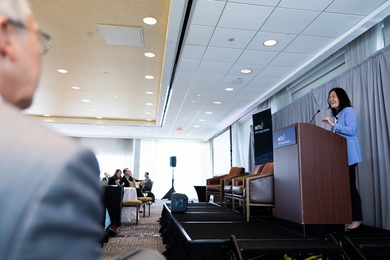In a letter to the MIT community today, Chancellor Cynthia Barnhart and Medical Director Cecilia Stuopis released the Committee on Medical Leave and Hospitalizations (CMLH) report outlining ways to enhance MIT’s current leave and hospitalization procedures and policies for undergraduate and graduate students.
“Last year’s Committee on Academic Performance review of undergraduate leave and return practices discovered that, while less than 1 percent of MIT students are hospitalized or take leave for mental health reasons every year, these issues create anxiety in many students and can become a barrier to their seeking care,” wrote Barnhart and Stuopis. “This finding troubled us and demanded a further examination. That’s why we formed the CMLH and charged this group of faculty, students, and staff with assessing our current practices and policies and making recommendations for change.”
The CMLH, which was co-chaired by Department of Brain and Cognitive Sciences professors Rebecca Saxe and Laura Schulz, gathered feedback from the MIT community through two open forums, a community survey, and direct outreach to faculty members, deans, and student groups. This feedback, coupled with an examination of MIT’s current policies, the Committee on Academic Performance’s findings, and conversations with peer institutions, led the committee to make recommendations to “increase students’ trust in support services, reduce their fear and suspicion, create a climate in which students who need help are most likely and able to seek it, and to improve students’ experience even in these difficult circumstances.”
“I am deeply grateful to the members of the committee for bringing their passion, commitment, energy, and values to this set of complex issues,” says Saxe. “We sought to identify ways to lower perceived barriers for students to seek mental health care by adjusting MIT’s policies and procedures.”
Schulz echoes those sentiments and looks forward to the report’s implementation. “I am grateful to this institution for making mental health a priority. My hope is that the [report’s] recommendations and the efforts currently underway will foster a climate in which all of our students feel safe and supported in asking for help whenever they need it.”
In their letter, Barnhart and Stuopis expressed gratitude to Saxe, Schulz, and the entire committee “for the dedication, empathy, and problem-solving they displayed throughout the review process. We are thankful to them, and to the members of our community — particularly our students with first-hand experience with the leave and hospitalization process — for lending us their valuable time and their powerful insights."
Report recommendations
Over the course of its review, CMLH heard several consistent concerns from MIT community members about psychiatric hospitalizations, involuntary medical leave, broader medical leave policies, and trust and care seeking.
The report’s seven recommendations are designed to respond to the concerns the CMLH identified, by:
- Improving communications about the hospitalization process;
- Making the response to a student in crisis more “personal and humane”;
- Providing hospitalized students with a consistent point of contact;
- Ensuring that all admitted students, including hospitalized ones, feel they are part of the MIT community;
- Reducing the anxiety and perception of coercion created by the current required medical leave policy;
- Making the requirements for returning from a medical leave clearer; and
- Calling for an ongoing review and assessment of new policies and procedures.
CMLH member Taylor Sutton, who graduated last month with a degree in mathematics, experienced some of these issues firsthand in 2013 when he made the decision to take a medical leave after a hospitalization. “Having to deal with the MIT processes and policies — as they existed at the time — didn’t make my life any easier when I was seriously depressed,” says Sutton. “The committee formed its report out of concern for the best interest of students and spent a lot of time debating the right ways to approach each of the problems we identified. I believe we will see improvements to what I went through.”
Specifically, the CMLH recommended that MIT take the following steps:
- MIT Medical should provide a clear resource for students who are considering or undergoing hospitalization for mental health treatment. The guide, which Barnhart and Stuopis said is already in development in collaboration with students, will include a set of common questions and be easily accessible and regularly updated;
- To improve MIT’s response to students in crisis, MIT should consider revising its hospital transport procedures, including having MIT Police officers who accompany Emergency Medical Services to on or off campus locations undergo special training for mental health emergencies;
- The Division of Student Life’s new Coordination Assistance Response (CARE) Team — three full-time staff members who are now overseeing wellness checks, following up on Dean on Call incidents, and providing direct, personalized support for hospitalized students — should be a consistent point of contact for hospitalized undergraduate and graduate students. They should also work to support residential life teams in the hospitalized student’s residential community, and work to reintegrate students when they are ready to return to campus;
- To help reaffirm that all admitted students, even hospitalized students, are part of the MIT community, the Institute should make clear that most students who wish to return to campus do so;
- Additionally, hospitals and MIT Medical should work in collaboration with hospitalized students to plan for treatment and next steps after discharge;
- Because the perceived threat of the current “Involuntary Medical Leave” policy creates anxiety and the perception of coercion among students, MIT should eliminate the policy and replace it with a newly written “Medical Leave and Return” policy that clearly states the conditions under which a medical leave can be mandated by the Institute;
- To address student feedback that the medical leave return process can feel “punitive,” the CMLH recommended that requirements be focused on medical treatment rather than external coursework during a student’s time away from campus, and the process should be transparent and confidential; and
- After two years, MIT should report back to the community about efforts to improve its policies and practices, and all students who return from a medical leave or hospitalization should be offered to complete an anonymous survey to assess whether the concerns addressed by the report are being addressed.









